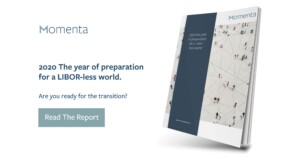The importance of starting your LIBOR journey – now
All players in the financial services sector are facing the biggest change since the implementation of the Euro, as firms start to transition away from the London Inter-Bank Offered Rate (LIBOR). $350 trillion worth of financial contracts are currently treated under the LIBOR rate, highlighting the sheer volume of debts where the index rates should be switched.
We recently conducted a survey that revealed 67% of the respondents felt their biggest challenge with regards to the transition would be centred around the additional pressures placed on them as a result of the Covid-19 outbreak. The chances are, if you work within financial services you have been impacted significantly by the pandemic, and have put your LIBOR transition plans to one side – either until the industry stabilises, or your firm is in a better position to cope with this change. The FCA and the PRA issued letters to banks and insurers explaining their expectations of institutions’ transitional planning for 2020 regardless of Covid-19 pressures, so if you are still thinking of reviewing your transitional plans in a few months time, think again.
The transition process will be lengthy and require additional resources and expertise. Unfortunately, there is no quick-fix solution, or a one-size-fits-all approach that can be implemented within an organisation. This transition will require a phase-by-phase review to ensure that all the aspects of it are fully met. So when should organisations start implementing this lengthy process? The answer is simple – as soon as possible.
The first step is sourcing how many contracts you have that are tied to LIBOR. It may be easy for some, but for others, it will involve the laborious task of sifting through all contracts from 1986 until today that have any relation to a LIBOR index. Ideally, you want to know how many contracts will require revision, because from this point on your contract analysis should begin, so the sooner you understand what work needs to go into revising your contacts, the better.
One of the biggest challenges will be that of repapering, and fallback language. Contracts need to be reviewed through two lenses – legal and financial – which will provide an understanding to the firm of both the risk and value of the transition. The new RPRs will be calculated differently to LIBOR, so contracts created under the new rates will differ from those under LIBOR rates. Repapering and fallback provisions will need to be analysed and completed for each contract.
Certain contracts will require additional work, as it is estimated that 10% of GBP LIBOR indexed contracts will not be able to use SONIA as a suitable alternate reference rate. Should this be the case, expert personnel will have to advise on what the next best alternative could be for both counterparties. With the revision of the fallback language and repapering, the new calculation will need to be worked out and attached to the contract.
At the time of entering into long-term LIBOR-indexed contracts, certainly before 2013, it is rather unlikely that parties will have contemplated that the reference index would cease to be published during the life of the contract. For all financial products such as bonds, IRSs and FRNs etc., the replacement of LIBOR with a different index (SONIA) will change the value of the transaction if that replacement index is simply substituted. Should this happen, as a result of the change, one party will gain and the other will lose.
SONIA is very different from LIBOR: LIBOR is a forward-looking, term rate, whereas SONIA is a backward-looking, overnight rate. SONIA is a smaller number than LIBOR, and so LIBOR cannot be replaced with SONIA. If it were, then the value of any particular product such as a loan, bond, or swap would change. Making the change while keeping value constant is one challenge, and the FCA has said that customers should not be disadvantaged by the change, but given that the calculation is complex, firms need to take steps to ensure a fair outcome is achieved.
Getting to grips with the new calculation will be another challenge. As you are working with both forwards and backward rates, complications will persist. The trick is to ensure that you get the calculation or the swap correct the first time, as companies really only have one chance to get it right.
Internal valuation models will need to be adjusted for replacement RFRs. The transition to an overnight RFR will lead to changes in the value of existing positions, which could be favourable to counterparties, meaning additional negotiation will be required. Organisations will need to engage with each of the counterparties to change the contracts amicably, leaving enough time for negotiations and perhaps disputes. The discussions are likely to be complex and technical, and additional legal expertise will be required.
Organisations will also have to implement a thorough communication plan to ensure that any clients they may have that are attached to such contracts are not only aware of the LIBOR changes and deadline, but also aware of how it will affect their contracts in the future once they have been ‘reset’. Communication with the end customer regarding their new rate is key, and regulators will be watching closely on this point.
The December 2021 deadline is extremely important and everyone should engage with their counterparties long before then to settle the issues. Leaving it until the very end could effectively mean that what the counterparty says goes. This transition may be a daunting one, but with the right expertise and resourcing, it can also be swift, effective, and efficient.
How can Momenta help you?
Momenta are a global contingent resource solutions firm. For over 30 years we have been partnering with companies in the financial services, legal, technology, and training and development sectors to cost-effectively provide the right people, with the right skills, at exactly the right time.
Given the mammoth task ahead, Momenta are partnered with one of the leading experts acting and advising on issues associated with the LIBOR transition, and have built teams to support in all aspects of the transition. This provides a holistic solution from start to finish, avoiding any time wastage and helping you to efficiently and effectively transition your contracts to a new index by the deadline. We would welcome a call to discuss your LIBOR plan and how we can assist you.
To set up a discussion email Libor@momentagroup.com and a member of our team will contact you.


